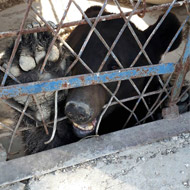
First group of animals reaches Syria/Turkey border
Nine abandoned animals have been rescued from an amusement park and zoo located near warn-torn Aleppo, Syria.
According to animal rescue charity FOUR PAWS, a truck containing three lions, two tigers, two Asian black bears and two hyenas has managed to reach the Syria/Turkey border.
From there, the animals will begin another journey to an animal rescue centre in Karacabey, where they will receive medical treatment. More animals from the zoo, known as “Magic World”, are expected to arrive at the border over the coming days.
The rescue mission is being carried out by FOUR PAWS together with international security experts.
Dr Amir Khalil, FOUR PAWS veterinarian and head of the mission, said: "The ongoing war has taken its toll on the animals. The lack of water, food and veterinary care has left the animals physically and psychologically traumatised.
“Several animals were also killed by severe bombings. There was no way for them to escape from this deadly trap. With our mission, we want to spread the message that humanity cannot be divided and that these suffering animals deserve to be heard and seen.”
Dr Khalil added that it was clear that the team had to leave the zoo as soon as possible. "The ever-deteriorating situation of the animals worried us. Also, wild animals such as bears and big cats, trapped in desolate enclosures, can quickly pose a threat to humans,” he said.
Due to intense fighting, operating in Syria is extremely dangerous. In recent days, ongoing fighting and clashes have taken place around Aleppo, Idlib and Afrin. This prompted FOUR PAWS to cooperate with international security experts who are familiar with the area.
With the permission of the zoo owner, the team entered the zoo along with local veterinary surgeons. The animals were then loaded onto trucks and taken to the Syria/Turkey border where they were handed over to FOUR PAWS.
“We are glad that the first animals have been taken out of the zoo and transferred to a safer area. However, more animals are still trapped in the amusement park 'Magic World,'” explained Dr. Khalil. “Depending on the development of the difficult situation around Aleppo, FOUR PAWS expects the remaining animals to arrive at the border in the next few days.”
Image (C) FOUR PAWS



 The Veterinary Medicines Directorate (VMD) is inviting applications from veterinary students to attend a one-week extramural studies (EMS) placement in July 2026.
The Veterinary Medicines Directorate (VMD) is inviting applications from veterinary students to attend a one-week extramural studies (EMS) placement in July 2026.